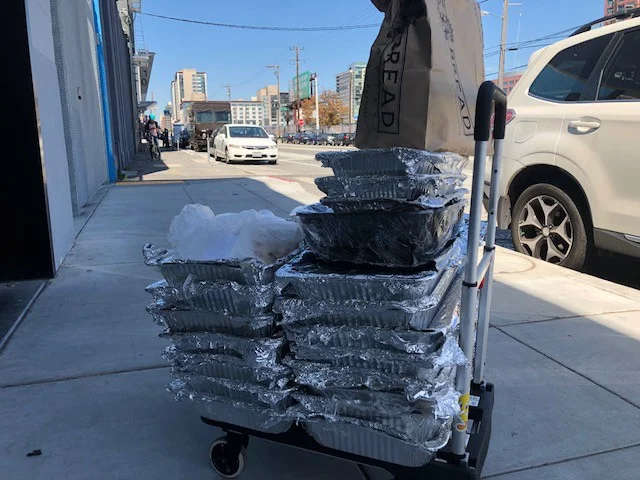One Food Rescuer’s Journey
Rescuing crackers from a dumpster.
The problem of food waste in modern America is a troubling irony. How can such a thriving land of abundant resources leave millions of its citizens experiencing hunger? If we are so efficient in generating vast wealth and technical innovation, how do we end up wasting $165 billion of food each year? This paradox has plagued my conscience for all of my adult life. Luckily, today there is a growing awareness of the situation, and we have more organizations than ever before devoted to solving this problem. I’m happy to be a part of one of them. Working as a Food Rescuer with Replate has allowed me to join the fight, saving hundreds of pounds of food each day from going in the trash.
Starting Small
Growing up in a working class home in rural Pennsylvania, I rarely experienced food insecurity. Even with our modest means, my parents always had a stocked pantry and food on the table. Transitioning into adult life was a different story. It was 2008, the nation’s economy was crumbling and so was my family. My parents lost their jobs and house, and within a few years spiraled into addiction and chronic homelessness. Adulthood and independence was thrust on me abruptly. While in college, I found myself working many extra jobs in kitchens and food service positions. Taking home leftover food at the end of my shifts became an essential way to keep myself fed.
Working at a sandwich shop in downtown Philadelphia, I noticed the vast amount of fresh bread and vegetables that went into the trash every day. Bringing some home in my bag each night meant that I could keep my stomach full, even when I was completely broke. Great! But I still thought about the large amount of food that I didn’t take. It was all destined for a landfill, and there were people in my community that needed it more than I did. Soon I was filling giant garbage bags with pounds of fresh bread every night and coming up with creative ways to use it. I would bring it to parties, stock my friends’ freezers, and hand it out to strangers through my street-level apartment window.
Seeing the Bigger Picture
The daily bounty of one Copenhagen dumpster
As time went on, my hobby of food rescue consumed my free time. I knew what hunger felt like and I didn’t want others to experience it. I learned the upsetting statistic that nearly 40 percent of U.S. food goes uneaten. My frustration pushed me to do more. I began dumpster diving on a regular basis. I scoured food courts and dining halls, always with a nod and a smile to the employees. During a bike tour of the west coast, I briefly lived off of leftovers from the L.A. Farmers Market and bakeries on my route, sharing word of the best dumpsters with anyone who would listen. I hitchhiked through all of Europe, stopping at every supermarket waste bin I saw, sharing their edible contents with friends and strangers along the way. I began to think of reclaiming trashed supermarket food as my civic duty. Here in the states, 10 percent of the U.S. food supply is wasted before it even leaves the retail shelf.
Living in the Bay Area has shown me a stark contrast of inequality that I haven’t experienced elsewhere. In San Francisco, there is a seemingly endless abundance of resources. However, the population of San Franciscans struggling with hunger is enormous, nearing 25 percent in 2017. Joining the team at Replate has allowed me to dive head-first into working on solutions.
An average day of catered leftovers
Finding My Calling
Filling my van with hundreds of pounds of food and driving it to hungry people every day is something I have always dreamed of. During my first days of Bay Area food rescue, it seemed too good to be true. The ability to redistribute such a large amount of fresh high-quality food is nothing short of a miracle. After a brief time of getting to know the folks at ECAP and other donation recipients in the area, I had a deepened connection to the community and a lasting feeling of satisfaction.
Some San Francisco office lunch leftovers
There is a long journey ahead for everyone involved in combating hunger, especially at the most local levels. If you find yourself thinking about these issues and feeling powerless, I would emphatically remind you that you’re not! Every action and intention counts. Simply opening a dialogue with those around you can have profound ripple effects down the road. Start a conversation with your local market about waste management. Check in on your neighbors to make sure they have enough resources. In the meantime, we will continue to work with compassionate and conservation-minded office spaces that choose to resist the food waste problem and ensure that everyone eats!



